Immanuel Kant Collection (6 vols.)
Digital Logos Edition
Overview
Known by many as the most influential philosopher since the Greeks, Immanuel Kant has had a vast influence on modern philosophy. Drawing on both the empiricists and the rationalists, Kant argued that humans gain knowledge of the external world though experience. However, he said, innate concepts in human reason shape that knowledge, giving it structure and form. He argued that conceptual knowledge and sensible knowledge must be understood as separate categories. An example of sensible knowledge is my seeing five red balloons; an example of conceptual knowledge is my concept of fiveness and redness.
The Immanuel Kant Collection contains six of Kant’s most important works. With the digital edition, key words and ideas are linked to other texts in your library. Compare Kant with both the rationalists and the empiricists with a click. Further, every word is indexed, allowing you instant access to any phrase or idea you want to read about.
Get an even better deal with the Philosophy Research Library (152 vols.).

Key Features
- All three of Kant’s critiques
- In-depth index
- Biographical summary
- Summary of his ideas by the translators
Product Details
- Title: Immanuel Kant Collection
- Author: Immanuel Kant
- Volumes: 6
- Pages: 2,283
- Resource Type: Topical
- Topic: Modern Philosophy
This title is included in the following collections
You can save when you purchase this product as part of a collection.
Modern Philosophy Research Lib...
$499.99$499.99Philosophy Research Library (1...
$799.99$799.99Logos 6 Orthodox Gold Legacy L...
$849.99$849.99Logos 6 Orthodox Platinum Lega...
$1,499.99$1,499.99
- $2,999.99
- $2,999.99
- $2,999.99
- $2,999.99
- $4,749.99$3,562.49
- $4,749.99
- $4,749.99
- $4,749.99
- $4,749.99
- $12,102.39$7,299.99
- $23,999.99$17,999.99
- $21,749.99
- $24,999.99
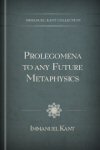
Published after Critique of Pure Reason, Prolegomena to Any Future Metaphysics restates and summarizes many of the main arguments. Kant also applies what he calls an “analytic” method, with a view to making his ideas clearer. The book also argues for the importance of Critique of Pure Reason and rebuts a negative review.
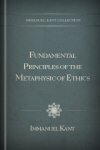
Fundamental Principles of the Metaphysic of Ethics is an extraction of various central concepts of Kant’s theory of ethics. Mainly taken from the Critique of Practical Reason, the book argues for the a priori existence of moral structure in the human mind. In this book, Kant lays the groundwork for his later ethical philosophy.
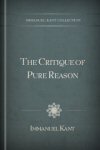
The Critique of Pure Reason is the first of Immanuel Kant’s three critiques. In it, Kant seeks to establish what human reason is capable of knowing without the senses. Kant argues that while reason is capable of arriving at some truths, it is not capable of comprehensive knowledge. Rather, says Kant, our understanding of reality comes by our mind shaping our sense experience. Our sense of time makes us see the world as temporal. Kant argues that it is impossible to have certain knowledge of a thing “in itself.” We can have accurate knowledge, but it is shaped by our perceiving minds.
One of the most influential works in the history of philosophy.
—The Oxford Companion to Philosophy
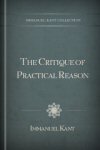
The second of the three critiques, The Critique of Practical Reason, takes up the subject of moral philosophy. Kant argues that the fundamental rule of morality is that it holds universally. He criticizes previous ethicists for saying that the moral person is working toward the greatest good rather than that the greatest good is the thing the moral person is aiming for. Morality determines the greatest good, not the other way around. Kant concludes the work with a plan for moral education.
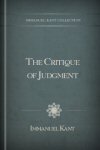
The Critique of Judgment, Kant’s third critique, takes up the subject of aesthetics. Kant divided the book into two parts: critique of aesthetic judgment and critique of teleological judgment. In the first part, Kant examines four “reflective judgments” about aesthetics: the agreeable, the beautiful, the sublime, and the good. The second part discusses the method of judging things according to their purpose or telos.
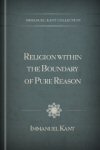
Religion within the Boundary of Pure Reason is divided into four “Pieces” that Kant originally intended to publish as a series of journal articles. The book discusses the place of rational religion, which forms the underlying skeleton of religion. The various historical religions are then discussed with attention to their ability to communicate the precepts of rational religion to the people.
About Immanuel Kant
Immanuel Kant (1724–1804) was born in Königsberg, Prussia, in a Pietist Lutheran family. He attended the University of Königsberg, becoming a lecturer there after graduation. In 1770, he accepted the chair of logic and metaphysics at Königsberg. He published and taught a variety of subjects, but focused on metaphysics and its relationship to physics and mathematics. He was heavily influenced by the writings of Leibniz, Newton, Hume, and Rousseau, drawing on both the empiricist and the rationalist schools. He wrote works of metaphysics, epistemology, ethics, aesthetics, and teleology. His revolutionary contribution to philosophy is his argument that human knowledge of the world comes from sense experience but is shaped by innate structures inherent in human reason.
Reviews
6 ratings
AeliusCicero
6/19/2014

David Leslie Bond
11/20/2013

Prayson Daniel
11/6/2013

Michael Mullen
11/5/2013
James Mills Jr.
10/29/2013

RICHARD A. RAY
10/23/2013